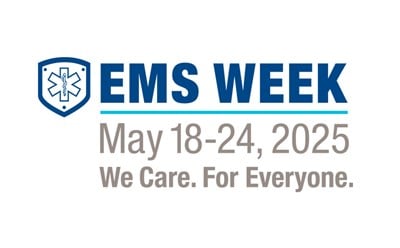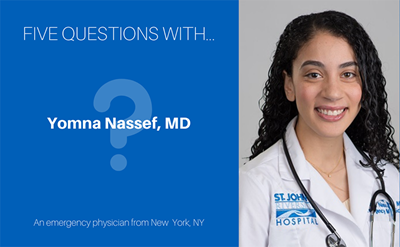Emergency medicine can be a turbulent and overwhelming field for the physicians, nurses, and other health care providers who are faced with life and death consequences each day.
Emergency physicians have historically had higher rates of career burnout and post-traumatic stress disorder (PTSD) than other medical specialties. Upwards of 65 percent of emergency physicians and emergency medicine resident physicians report experiencing burnout during their careers. While approximately 15 to 17 percent of emergency physicians, and upwards of 20 percent of emergency medicine residents met the diagnostic criteria for PTSD in 2019.
It’s clear this job can take its toll with data suggesting that, in the last year, as many as 6,000 emergency physicians have contemplated suicide and up to 400 have attempted to take their own life.
A poll from the American College of Emergency Physicians and Morning Consult released on October 26, 2020 shows that despite the growing toll that serving on the frontlines of the COVID-19 pandemic is having on emergency physicians, many are hesitant to seek mental health treatment. Nearly half (45 percent) of the nation’s emergency physicians do not feel comfortable seeking mental health treatment.
Despite the prevalence of depression, feelings of burn out, and other mental health issues, there is a legitimate fear of consequences that deters physicians from seeking the care they need, leaving many people with no better option than to suffer in silence.
Physicians seeking mental health treatment in our current system are concerned about possibly losing their medical licenses or facing other professional setbacks. Nearly three in five emergency physicians (57 percent) report they would be concerned for their job if they were to seek mental health treatment. Some state licensing boards continue to ask questions about physicians’ mental health histories or past treatment that appear to violate the intent of the American Disabilities Act—which prohibits discrimination against people with disabilities, including psychiatric disorders.
These intrusive questions about whether physicians have any psychiatric history have discouraged many who need psychiatric treatment from seeking it because of fear of the questions down the road. Practicing physicians with histories of psychiatric disorders or mental health counseling have at times also faced discrimination with respect to receiving hospital credentials and privileges.
Seeking care and support should be strongly encouraged, not penalized.
We must make sure that physicians and other health care providers can safely secure treatment for mental or other health issues that do not affect patient care without repercussions to licensing, credentialing, or future employment. Instead of asking a blanket question about any mental health conditions, it would be more appropriate if state licensing boards and other entities asked clinicians whether they currently have “any conditions for which they are not being appropriately treated, that would impair their judgment or that would otherwise adversely affect their ability to practice medicine in a competent, ethical and professional manner.”
Fighting the COVID-19 pandemic is taking a toll on the mental health of emergency physicians, and we don’t yet know the true extent it will have on everyone working on the frontlines.
The job of an emergency physician is already hard, but this is far from business as usual. More than eight in 10 (87 percent) of emergency physicians report feeling more stress since the start of the pandemic. This virus is the greatest public health threat of our time and many emergency physicians feel like we are going to battle without enough protection.
Each community is facing new and unique challenges are they continue to battle against the pandemic. While some hospitals are stretched beyond capacity forcing emergency physicians to make excruciating decisions given their sparse resources, others are grappling with devastating drops in patient volume resulting in pay cuts, furloughs, and even layoffs.
We manage these challenges while we maintain social distance. For some of us that means isolation without our friends or families. We are in the fight of our lives and when our day ends, many of us retreat to solitude in hotels away from our homes, in our own garages, or even a tent in our backyards for weeks at a time.
The American College of Emergency Physicians (ACEP) is leading the way to dismantle the current barriers for physicians who seek mental health treatment and reduce the stigma of physicians’ mental illness.
ACEP continues to support and inform physician mental health legislation in Congress. Emergency physicians applaud the passage of the Dr. Lorna Breen Health Care Provider Protection Act. This law is named for the emergency physician tragically lost to suicide in April 2020. Key features of this bill include:
- Major steps to reduce and prevent suicide and burnout by creating behavioral health and well-being training programs.
- Support for a national campaign to encourage health care professionals to seek support and treatment.
- A federal study into health care professional mental health and burnout.
- Grants to establish and expand mental health support services.
ACEP is proud to partner with #FirstRespondersFirst and the Dr. Lorna Breen Heroes' Foundation to launch a hub of mental health and resiliency resources alongside grant funding to support the well-being of health workers.
ACEP developed a statement with over 40 leading medical organizations, including the American Medical Association and the American Psychiatric Association, that outlines recommendations for removing existing barriers to seeking treatment, including the fear of reprisal, and better encouraging professional support and non-clinical mental health initiatives, such as peer support, for physicians.
ACEP also strongly supports the Joint Commission's stance that a health professionals’ history of mental illness should not be used as an indication of their current or future ability to practice medicine. Additionally, ACEP offers free mental health counseling sessions for its 39,000 individual emergency physician members, peer-to-peer support meditation guides, a 24-hour support line, and other tools and resources.
 American College of Emergency Physicians
American College of Emergency Physicians







